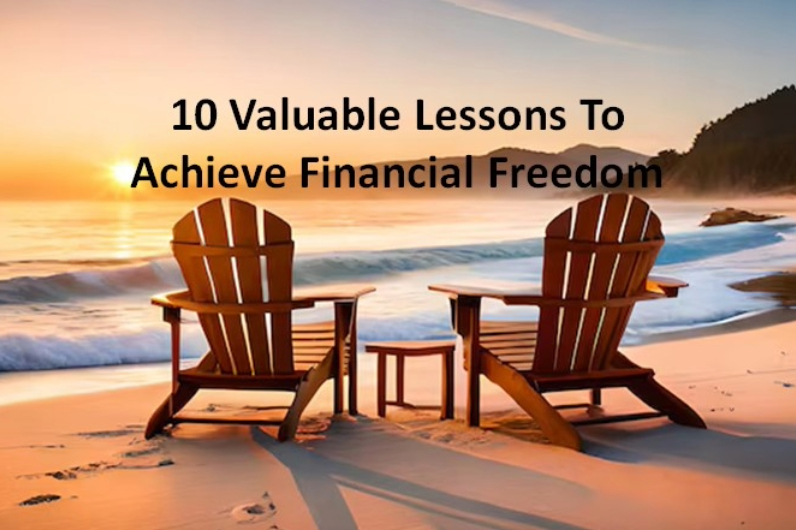Develop a Wealth Mindset
If you think you can, you can. If you think you can’t, you can’t. Becoming financially free starts with having the right mindset. Focus on opportunities rather than limitations.
Wealth is typically created over over years. This is why it is so important to practice delayed gratification.
Create specific and measurable objectives and goals and assign realistic deadlines.
There will be setbacks on your journey to financial freedom. View them as learning opportunities. Many wealthy people stumbled on their journey to financial freedom.
Be resilient and persistent. You may need to reinvent yourself. Just do not give up on your vision.
Live Below Your Means
Avoid lifestyle creep. Some people get the inclination to change their lifestyle as their income increases.
You can make all the money you want but if you spend more than you make, you are on the road to financial ruin.
What purpose does it serve to buy stuff you don’t need with money you don’t have to impress people you don’t know?
Your lifestyle does not need to materially change as your income increases over time.
Do NOT let social media or peer pressure dictate your spending habits.
In The Millionaire Next Door – The Surprising Secrets of America’s Wealthy, Thomas J. Stanley, Ph.D. and William D. Danko, Ph.D. lay out their findings from years of having studied how the wealthy become wealthy and stay wealthy.
What they found is that affluent people typically follow a lifestyle conducive to accumulating money. In the course of their investigations, they discovered 7 common denominators among those who successfully build wealth.
- They live well below their means.
- They allocate their time, energy, and money efficiently, in ways conducive to building wealth.
- They believe that financial independence is more important than displaying high social status.
- Their parents did not provide economic outpatient care.
- Their adult children are economically self-sufficient.
- They are proficient in targeting market opportunities.
- They chose the right occupation.
I would add #8. If you have a partner, make sure you are compatible with this person for life.
Master Budgeting
Tracking income and expenses is essential. Having a realistic budget is critical otherwise we just set ourselves up failure and discouragement. The internet has a wealth of information on how to create and maintain a budget if this is a foreign exercise to you.
Track your inflows and outflows (including their timing) so you can determine what inflows/outflows need adjusting.
The often used 50/30/20 allocation calls for 50% of your after-tax income toward needs, 30% to wants, and 20% to savings/investments. To accelerate the time frame over which you want to become financially free, ramp up the percentage allocated to savings/investments.
Acquire Financial Education
Investing early and consistently is critical. Unless we acquire financial education, however, our investment decisions could be disastrous.
The Books section of this site reflects many of the books and articles I have read and recommend.
I also highly recommend, seeking advice from people who have achieved success.
Invest Early and Consistently
Investing when you are in your teens/early twenties is typically not at top of mind. This, however, is when you should start investing. Do what most people won’t do so you can achieve what most people will never achieve.
Even small amounts can grow significantly over time. Don’t wait until you have, for example, $100,000.
Consistently invest small amounts through a broad based exchange traded fund (ETF). Avoid mutual funds and do not invest in individual companies unless you understand financial statements and you have the right temperament.
In various posts, I disclose limited information about the investments made by a couple of young investors I have been helping for the past few years; they have bypassed ETFs because the amounts they have to invest are reasonably significant.
There is now an additional young investor to whom I have offered some suggestions; I disclose minimal information for confidentiality reasons.
This new young investor is capitalizing on modern technology to legally make more money in a matter of weeks that most North Americans make in a few years.
Given this, the need for a Will, a Power of Attorney for Personal Care, and a Power of Attorney for Finances are critical.
This young investor is now investing through a:
- non-registered (taxable) account;
- Tax Free Savings Account (TFSA);
- First Homeowner Savings Account (FHSA); and
- Registered Retirement Savings Plan Account (RRSP).
The maximum contributions are being made in all registered accounts. In addition, funds are set aside to invest at the beginning of 2025 the maximum permissible amounts for the year. Additional investments will be made throughout the year in the non-registered account AND sufficient funds are being set aside for tax purposes.
This young investor’s investment time horizon is decades and their investment knowledge is negligible (this will change). My suggestion, therefore, is to merely invest in Berkshire Hathaway Inc. (BRK-b).


